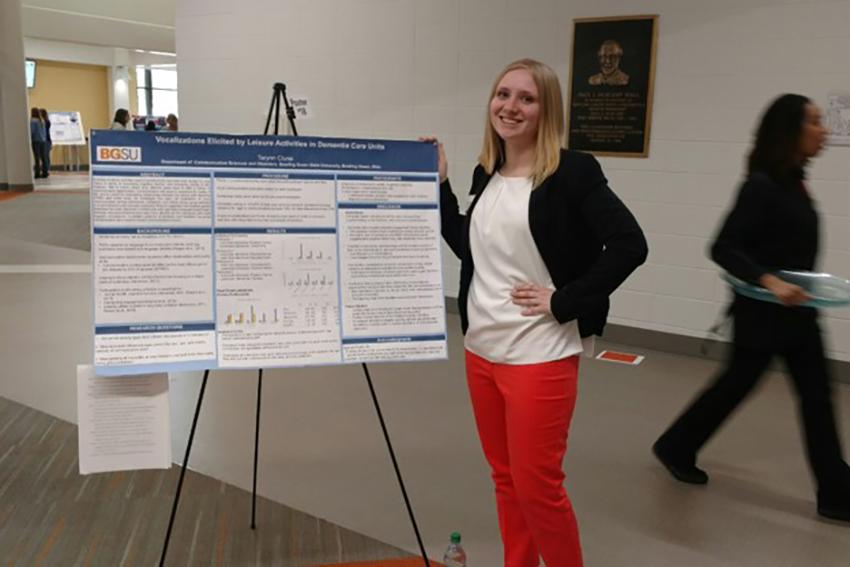Clune pursues path to CDIS research career through Honors Project
Tarynn Clune has been committed to serving individuals with dementia since she was 16 years old. She worked in a memory care facility from that young age, and developed a compassion for this often-neglected population that led to her selecting Communication Sciences and Disorders (CDIS) as her major. Her career goal is to complete a clinical master’s degree and move straight on to a research doctoral program, with the ultimate aim of a faculty position teaching and doing research in the area of neurogenic communication disorders.
Clune has been extremely active during her time at BGSU, including serving as an Honors Ambassador and on the Student Advisory Board for the Honors College, and in leadership roles for the National Student Speech Language Hearing Association, of which she currently serves as president. She also worked as an Academic Peer Mentor, and Peer Facilitator, in addition to her role as a research assistant first in the Motor Speech Lab, and later in the Interactive Aphasiology Lab. She continues to work at the memory care facility summers and during school breaks, maintaining her connection with the residents.
When Clune was seeking a mentor for her Honors Project in 2015 as a sophomore, she met with a number of faculty members in Communication Sciences and Disorders. At that time, no one on faculty was studying cognition and dementia, and while she already had research experience volunteering in Dr. Jason Whitfield’s Motor Speech Lab, she knew she didn’t want to do a project in that area. She met with Dr. Lynne Hewitt, professor in CDIS, and discussed her many ideas for investigating quality of life in residents of memory care units. Hewitt’s area of research being autism, the overlap between Clune’s ideas and Hewitt’s research was slim. With further discussions, they were able to find a common ground in pursuing a study utilizing discourse analysis, a method with which Hewitt was comfortable.
Clune’s experience working in the memory care unit made her curious about the role of daily group activities in promoting social engagement and communication. Her project investigated whether the type of activity residents engaged in impacted the amount and quality of their communicative interactions. Dr. Hee Soon Lee, professor in social work, had completed work with students on the role of music in memory care, and agreed to serve as the project co-advisor. After some early disappointments with finding a site for her research, Clune was fortunate to find a willing partner in town. As the project unfolded, the CDIS department brought on board a new faculty member with expertise in neurogenic communication disorders and cognition, Dr. Brent Archer. With Archer’s assistance, data collection and coding were refined and finalized. Clune went on to collect her data, developed a coding protocol, and trained assistants. Her work was presented at the Ohio Gerontology Association meeting, and she was awarded a prize for both the best student paper as well as the paper that most reflected the conference theme. It has been accepted for presentation as a poster at the American Speech-Language Association (ASHA) in Los Angeles this November. Because of her work as an undergraduate researcher, Clune has been selected to join ASHA’s PROGENY program—Promoting the Next Generation of Researchers.
“Tarynn is rare among students in our field who actively pursue research as a career objective—many are interested in clinical work, but fewer in research careers.” Clune took advantage of the many opportunities afforded her in the Honors College and in her home department of CDIS. She is well on her way to a career as a researcher seeking to positively impact the lives of people with dementia and their families. “Tarynn is rare among students in our field who actively pursue research as a career objective—many are interested in clinical work, but fewer in research careers,” said Hewitt. “Starting early really helps get you on the right path to that career, and it is important for our field to attract young researchers like Tarynn. In communication disorders and sciences we have a shortage of professors, so we are always seeking ways to get students interested in research—I never needed to do that with Tarynn as she came to me already dedicated, and all we in CDIS needed to do was mentor her and keep her on the path.”
Updated: 01/23/2020 04:34PM
